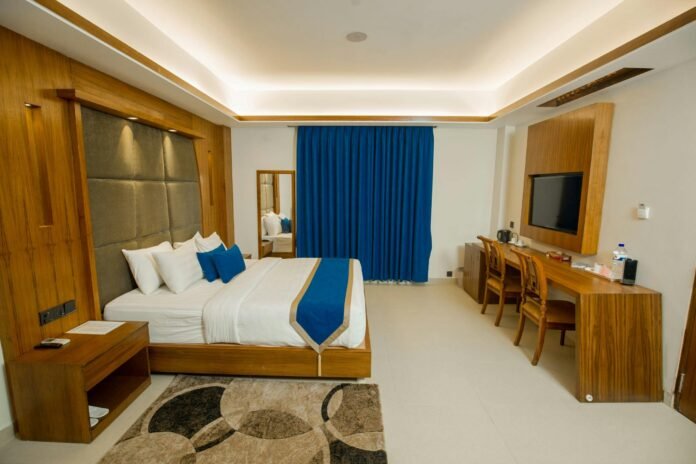The hospitality industry is primarily focused on providing a seamless, enjoyable experience for guests. One of the key elements in enhancing this experience is through the use of hospitality technology products. In recent years, hospitality TVs have evolved from simple in-room entertainment devices to smart, integrated hubs of guest engagement. These advancements in hospitality TV systems are reshaping how hotels deliver entertainment, improve connectivity, and provide personalized services to ensure that guests enjoy their stay even more.
Table of Contents
1. Smart TVs with OTT (Over-The-Top) Integration
With the rise of streaming services, guests expect the same level of entertainment in hotels as they enjoy at home. Modern hospitality TVs now come equipped with OTT platform integrations, including popular streaming apps like Netflix, Hulu, Amazon Prime, and Disney+. This allows guests to log into their own accounts and pick up where they left off in their favorite shows or movies, making the hotel stay feel more like an extension of their home environment.
For hotels, this technology has become a critical amenity, as it significantly reduces the demand for pay-per-view movie services. Guests prefer to watch their preferred content at their own pace, and the ability to access streaming platforms without having to bring external devices or connect cables makes their experience smoother and more enjoyable.
2. Personalization and Guest Profiles
One of the most exciting developments is the rise of personalization in hospitality TVs. New systems allow guests to create profiles that store preferences such as favorite channels, preferred language settings, streaming service logins, and even light and temperature settings in the room. This personalization is particularly appealing to frequent travelers or loyalty members who return to the same hotel chains, as it creates a customized in-room experience.
Beyond entertainment, some hotels are integrating their loyalty programs with these systems, enabling guests to view their rewards points, receive targeted promotions, or get recommendations for on-site services like dining or spa treatments based on their past preferences.
3. Voice-Activated Controls and Virtual Assistants
The rise of smart home technology is spilling into the hospitality industry, and voice-activated controls are becoming a sought-after feature in hotel rooms. TVs equipped with virtual assistants like Amazon Alexa or Google Assistant allow guests to control the TV, adjust room settings, order room service, or request additional amenities without picking up the phone or leaving their seat.
For example, guests can simply say, “Alexa, turn on Netflix,” or “Google, raise the room temperature to 72 degrees.” This hands-free interaction provides an elevated sense of luxury and convenience, particularly for tech-savvy travelers.
4. Interactive Services and In-Room Commerce
Another exciting development is the integration of interactive services into hospitality TVs. In addition to entertainment, modern systems now act as a central hub for accessing hotel services. Guests can use the TV to make dining reservations, book spa treatments, request housekeeping, or order room service. Some systems even allow in-room shopping, enabling guests to browse and purchase products from the hotel’s boutique or nearby stores directly from the TV.
This integration not only enhances guest convenience but also creates new revenue opportunities for hotels. By making services accessible and easy to use, hotels can increase the likelihood that guests will take advantage of these offerings during their stay.
5. Casting and BYOD (Bring Your Own Device) Solutions
In an era where people carry personal devices everywhere, hotels are increasingly offering casting solutions to allow guests to project content from their smartphones, tablets, or laptops onto the in-room TV. This feature is a win-win: guests can easily access their own content and media libraries, while hotels can avoid the expense and complexity of providing extensive entertainment libraries.
Casting solutions have become even more popular due to the increasing use of mobile devices for entertainment. Whether it’s watching YouTube videos, sharing photos from a trip, or reviewing a business presentation, guests appreciate the flexibility and convenience of connecting their own devices to the TV screen.
6. 4K and UHD Displays
In keeping with the demand for high-quality visuals, hotels are increasingly upgrading to 4K and Ultra High Definition (UHD) displays. These TVs offer sharper images, better color accuracy, and a more immersive viewing experience. While high-end hotels were the first to adopt this technology, it is now becoming more common in mid-range and even budget accommodations.
This trend aligns with the broader move toward higher-quality guest experiences across all sectors of hospitality, ensuring that the visual aspect of in-room entertainment meets the expectations of modern travelers who are accustomed to high-definition content.
7. Energy Efficiency and Sustainability
Modern hospitality TVs are also being designed with energy efficiency in mind. With sustainability becoming a top priority for both hotels and guests, many manufacturers are developing eco-friendly TV models that use less power and contribute to a hotel’s overall green initiatives. Features such as automatic power-off when not in use, energy-saving modes, and low-energy LED backlighting are helping hotels reduce their carbon footprint while still delivering top-notch guest experiences.
Conclusion
The evolution of hospitality TVs is driven by the growing demand for personalized, convenient, and high-tech in-room experiences. Smart TVs with OTT integration, voice-activated controls, interactive services, and BYOD capabilities are not just enhancing the entertainment aspect but are becoming central to the overall guest experience. As hotels continue to adopt these technologies, guests can expect their stays to become increasingly tailored, connected, and immersive, resulting in greater satisfaction and higher loyalty for hospitality brands.
Apart from that if you want to know about 5 Tips to Keep Your Instagram Account Safe from Hackers then please visit our Technology Category.



























